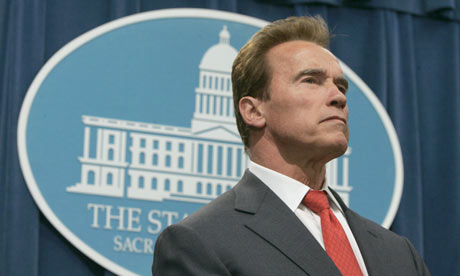
Arnold Schwarzenegger plans to drop traditional textbooks in favour of online material. But is it a good idea?
No, according to Professor Chris Husbands, the dean of the culture and pedagogy faculty at the University of London's Institute of Education, who says the plans are little more than a "cheapskate attempt to reduce costs under the guise of modernising resources".
While the web is brilliant for collecting information, scanning and picking out facts, he says, it is less good for higher-level skills such as evaluation and critical understanding.
"I was taught to precis text at school and I'm not sure that children are taught to critically evaluate the information they can easily find on the web," he said.
"There's something about print that's a more efficient way of pulling together and preserving text that people can access in a democratic way."
Seb Schmoller, the chief executive of the Association for Learning Technology, said the move could be discriminatory.
"If students have an entitlement to text books but are instead required to access books online, this may distance or exclude them from the content," he said.
"Online content might be more up-to-date and more cheaply available, but not everybody will have a device or Internet connection to access it. Books and online content each have their own different flexibilities. You can dip into pages, read them anywhere and write in notes. On the other hand you can't easily search them or cut and paste from them."
He said the online support that some publishers provide with textbooks is itself costly to produce, as is the basic content of text books and their updating. Claiming that putting text books online will save money is probably an oversimplification.
Previous attempts by British ministers to advocate the use of modern technology in the classroom have come unstuck.
In 2007 the former education secretary, Alan Johnson, came under fire for recommending children use the free online encyclopedia Wikipedia for schoolwork.
But things have changed since. Information and communication technology replaced science at the heart of the revamped primary curriculum unveiled earlier this year, which decided that children should be able to use Google in their first year of school and publish websites and podcasts by the age of 11.
• This article was amended on Wednesday 10 June 2009 to correct some quotations from Seb Schmoller of the Association for Learning Technology.

